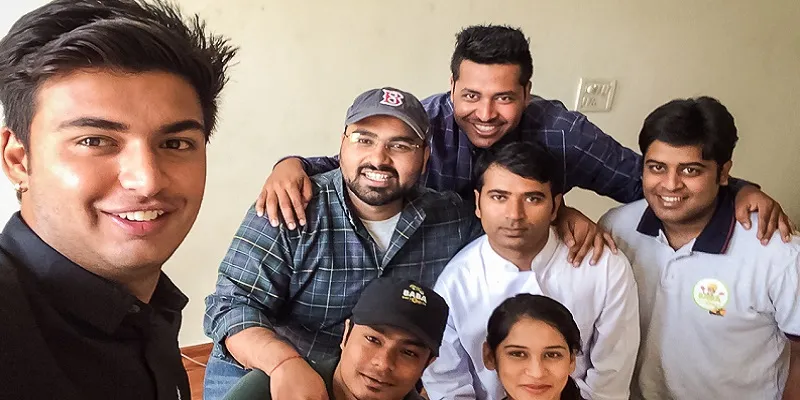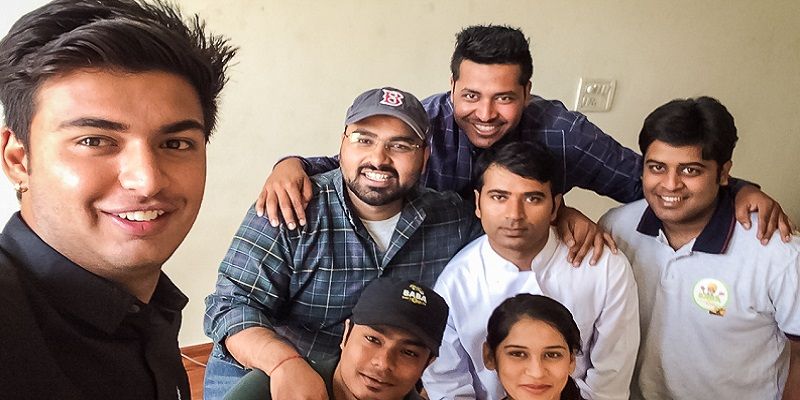Ex-Investment Banker wants to cater to working professionals craving home-style food
Great quality food at the click of a button has been a favorite for most foodtech startups. Especially in cities like Bengaluru and Gurgaon, where there have historically been an influx of people coming in from different parts of the country. It was this craving for great North Indian home food that gave birth to Baba Fattoosh. A foodtech startup, it has a kitchen setup with chefs and caters to the areas around Marathahalli, Whitefield, and Indiranagar.
Baba Fattoosh was born with one aim – to be the go-to provider of home-style food for people living away from home. “There is a dearth of affordable and authentic North Indian food in Bengaluru, and despite the different food startups in the city, they do not provide basic home food, which people crave,” says 28-year old Devesh, Founder, Baba Fattoosh.
The idea came to Devesh when he was travelling back to India while working as an investment banker at Goldman Sachs in New York in 2014. While in Mumbai and Bengaluru, he began researching people’s preferences to understand what the customer’s needs actually were and if it was available in the market.

What do customers want
“After surveying close to 700 people working in commercial areas in both cities, we realised that there is a huge gap in what's available in the market and what people who are living away from home actually want to eat,” adds Devesh.
He adds that while people were excited about eating different kinds of cuisine, they would order these possibly twice or even just once in a fortnight. They realised that the main struggle most people who stay away from home had was finding something that they grew up eating, something that suits their taste palate, something that's sustainable and affordable.
“That’s exactly what defines our product - Dal, Subzi, Roti, Chawal at a very pocket-friendly price of less than 150 bucks,” says Devesh. When he was travelling to Bengaluru and visiting one of his friends, Devesh met Harsh Vardhan Bansal, who is now a co-founder in Baba Fattoosh. Prior to this Harsh was working in steel trading with Stemcor in London, West Africa and Dubai. He had just come back from Dubai and was looking for opportunities in India just as Baba Fatoosh was about to be launched.
One evening, Devesh and his friend were discussing the problem and the potential challenges that could arise, and Harsh joined in. Since the product had both kitchen and delivery in the mix, they knew they had to have a good chef onboard. A friend had recommended Jaffar, a senior chef with Marriot Hotels, who was then thinking of quitting his job at Marriot and being more than just a chef. They presented their idea to him, and he immediately agreed to come on board.
In the food industry, the one thing that poses the biggest challenge when scaling is control on quality. Devesh adds this is why they took their own time to scale, but now, after operating for over eight months, they believe that their model will work.
Ankit Mohanty, a regular at Baba Fattoosh, says that the good homemade food provided by Baba Fatoosh helps him not worry too much about his health, and it also is easy on the pocket. The team claims that they get an average of 315 orders in a day and have grown 20 per cent month-on-month, their repeat customer rate is at 73 per cent. In the next five to six months, the team intends to cover all commercial pockets of Bengaluru and focus on executive lunches.
The burgeoning foodtech space
Food delivery, restaurant aggregation and Internet restaurants, and the number of players in this space is growing despite market conditions. Players like Zomato, Swiggy, Hola Chef, InnerChef , Yummist and FreshMenu are some of the key players in the segment today. Even with SpoonJoy, Eatlo and Dazo shutting down operations and TinyOwl rolling operations back from certain cities, there are many new players cropping up.
Also, if you look at the foodtech market and compare it to the likes of China, $35 million and $60 million in funds raised is considered one of the bigger investments in India, while Chinese food delivery and group-buying company Meituan-Dianping raised a whopping $3.3 billion. According to China e-Commerce Research Center, Meituan’s transaction volumes reached $860 million in the first six months of 2013.
Seedfund Venture Partner and accomplished investor/mentor Sanjay Anandaram says that most technology-enabled food businesses are operations-intensive. “Most of these app-based food businesses gain initial traction in certain pockets of a city, but the same cannot be expected from all parts of the country,” he adds. To ensure long-term sustainability, foodtech startups need to focus on their unit economics and have better control on both supply and demand.







![[Startup Bharat] Y Combinator-backed BeWell Digital is enabling the digital transformation of radiologists](https://images.yourstory.com/cs/2/40d66ae0f37111eb854989d40ab39087/ImagesFrames31-1648033042143.png)

